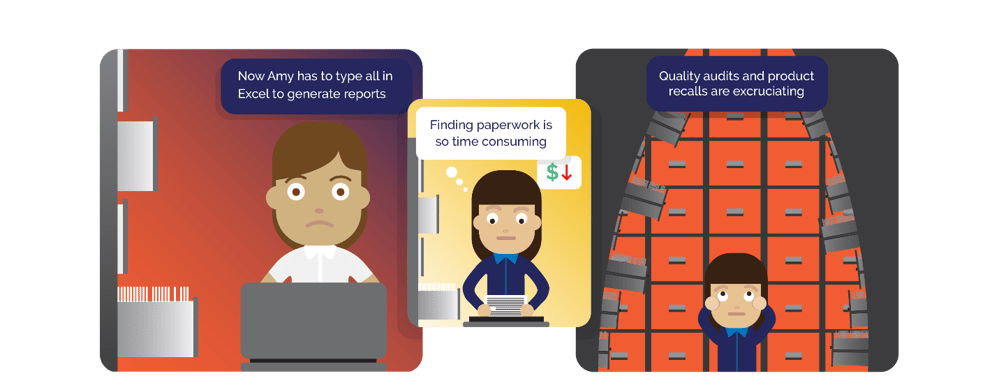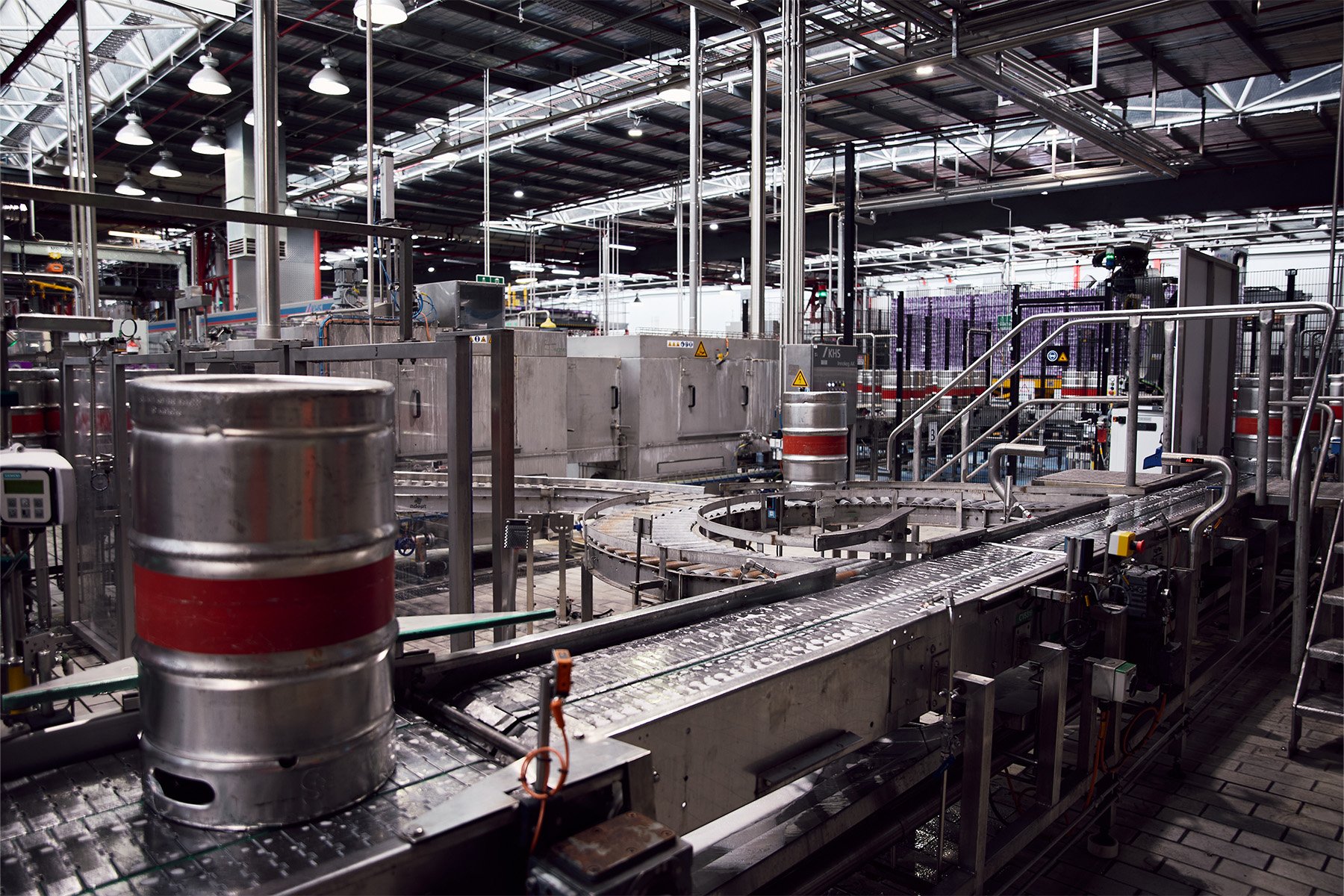As supply chains become complex and food and beverage manufacturers expand into new markets, the quality management process becomes more challenging.
Many companies believe they are following best practices, but may find these processes are not as well-defined as they think. Unfortunately, this knowledge may come as a result of an incident — which means finding out you are unprepared in the thick of a stressful situation.
Quality management in food and beverage manufacturing has become more intense
In recent years the focus on and importance of quality management has intensified.
We’ve seen market demand for product quality, safety, serialisation and fully traceability increase. Food Standards Australia New Zealand statistics show that recalls in food and beverage rose by more than 44% from 2017 to 2018.
The growth of 24-7 media coverage and social media means news of food recalls can be swiftly spread among consumers. The risk of lost market value and damage to the brand’s reputation is now much higher than in previous years.
In a Harris Interactive poll, 55% of consumers indicated they would switch brands temporarily following a recall, while 15% of respondents said they would never purchase the recalled product again and 21% would avoid purchasing any brand made by the manufacturer of the recalled product.
Never has there been a more pressing time for quality managers to ensure they can produce accurate product data quickly and count on their quality processes to guarantee product specification adherence, every time.
Solving these quality management challenges
Until recently, age-old problems in quality management such as paper-based systems, data recall and process adherence have been challenging to fix.
Digital solutions are providing the answer, specifically track and traceability solutions and a thing called ‘workflow automation’.
We explain three of the most common quality management challenges our Fast-Moving Consumer Goods (FMCG) clients face, and how automated workflows are helping to solve them.
Problem 1: disparate, paper-based information systems
We don’t have to explain to you that manufacturing is made up of many operational processes and the documentation of data for each of them can be a massive, time-consuming effort. So, when this is spread across multiple information systems, it becomes even harder to manage.
This is a common problem for Nukon’s FMCG customers. They run their production work orders, preventative control plan or raw material workflows by compiling information from a Manufacturing Information Systems (MIS) such as OFS, Manufacturing Execution System (MES), Warehouse Management System (WMS) and a number of other information sources and formats such as Excel spreadsheets.
The shift supervisor or production manager has to then make sense of the information, plan the work order, then print paperwork from multiple systems and Excel files and distribute this to the production line. The operators then execute the orders from this paper. Quality checks are also recorded manually on paper.
You will probably agree with us that this is not an effective approach.
 Multiple information sources and formats make it difficult for the production manager to interpret, and
Multiple information sources and formats make it difficult for the production manager to interpret, and
to then plan the work orders to hand to operators.
Solution:
Automated execution of the workflow solves this challenge by integrating these data sets and pushing out a workflow to operators electronically. It coordinates different IT and OT systems, people and machines to run the process.
Integration of disparate information improves the process itself, and allows managers to analyse the workflow from a centralised dashboard. Here, they can identify where and when non-conformance events might be occurring more often, and improve the overall workflow and thus the Process Control Plan (PCP).
Problem 2: Traceability and quality data integrity
Paper-based quality systems inherent in manufacturing present another challenge — maintaining data integrity.
Many companies overlook the storage and management of quality data because once a product has passed inspection, the data is needed only in the event of a product recall or audit.
But in a 2014 Procurement Leaders survey, 60% of consumers surveyed either agreed or strongly agreed with the statement that manufacturers are not transparent about where their goods come from. With product transparency important for consumers, quality managers and CIOs need to be able to produce the data quickly, safeguard it from fire or theft, and ensure the integrity of the data itself.

Another challenge of paper-based quality systems is maintaining the integrity of the data. Poor data management
practices lead to delays in response to external demands, such as product recalls.
Some problems we notice in data management include:
- Manual data entry: Quite often, data from the paperwork is manually keyed into Excel or other systems, like an ERP, so reports can be run on the data. This is time-consuming and can be prone to error.
- Poor filing systems: After a production run has been completed, paperwork is received by a data clerk to be put in filing cabinets. Finding the correct paperwork can be difficult if faced with quality audits or product recalls.
These practices leave the business unable to respond to external demands in a timely, responsible manner. If a food recall is necessary, delays in taking action are not looked upon favorably by your market!
Solution: Improved data collection, storage and analysis
Workflow solves this problem by providing the tools to record information, and the backend database to store it. The removal of paper in the workflow means operators enter quality data via barcode scanning, photos or entry into a phone or device. This leads to faster collection and consistent entry of data, and can alert the management team whenever an issue occurs.
The workflow’s centralised database ensures that all quality information is kept safe, orderly and accessible. Once this data is collected, Nukon can develop dashboards and reports that allow managers to quickly identify and rectify production issues, and look up product batches quickly in the event of a product recall customer complaint.
Read more: Is real-time reporting with the real-time cost for your factory?
Problem 3: Adherence to Process Control Plan (PCP)
A big challenge for quality managers is in ensuring the PCP is carried out the correct way, the same way, every time. Given what we all know about human nature, this feels like an impossible task, even for the most dedicated team.
Operators often use paperwork to understand the work order and product spec, and which quality checks need to be completed. They only know the business process from training and SOPs, which means the way work is carried out can vary from operator to operator.
This means managers often have no way of identifying and understanding how these variances impact on the PCP.
Solution: Accurate execution of quality management process, every time
Automated workflows are executed by a workflow engine. The engine does not change its behaviour like people do, so quality plans can be tightly managed and executed.
The workflow prescribes set tasks to the operators to ensure there is no variation in the process. Alert notifications are sent to operators when tasks are required to be completed to allow them to act at the right time, and then carry on with their usual work. This forms the foundation of Nukon’s connected worker concept.
Workflows can also improve document control for PCPs, ensuring any identified changes are pushed out to operators quickly, without the hassle of manually updating documents.
It’s never too late to review your quality management approach
The competitive nature of the FMCG market means maintaining a high-quality product is a crucial way to preserve shelf space. Quality management is about so much more than fulfilling compliance requirements — it is an essential component of the customer service offering.
An assurance of quality has a massive influence on customer satisfaction and brand loyalty. Product reputation matters, which is why it is so important for quality managers to be able to preserve and access data that can drive product safety and improvement.
By implementing digital solutions, such as workflow automation, manufacturers are able to deliver improved product traceability while also retaining accurate quality data. A commitment to quality and transparency in manufacturing processes is quickly becoming a customer expectation — pushing more manufacturers to take action and implement workflows.
Nukon deliver powerful workflow solutions that can enforce adherence to production processes, reduce time spent monitoring assets and allow operators to focus on continuous improvement activities. Working with an international wine company, Nukon has been able to increase quality control plan adherence through the digitisation of key paper-based processes. Read more: Paperless system transforms quality management.
A portion of this blog was originally published as a guest article with our partner, OFS.





